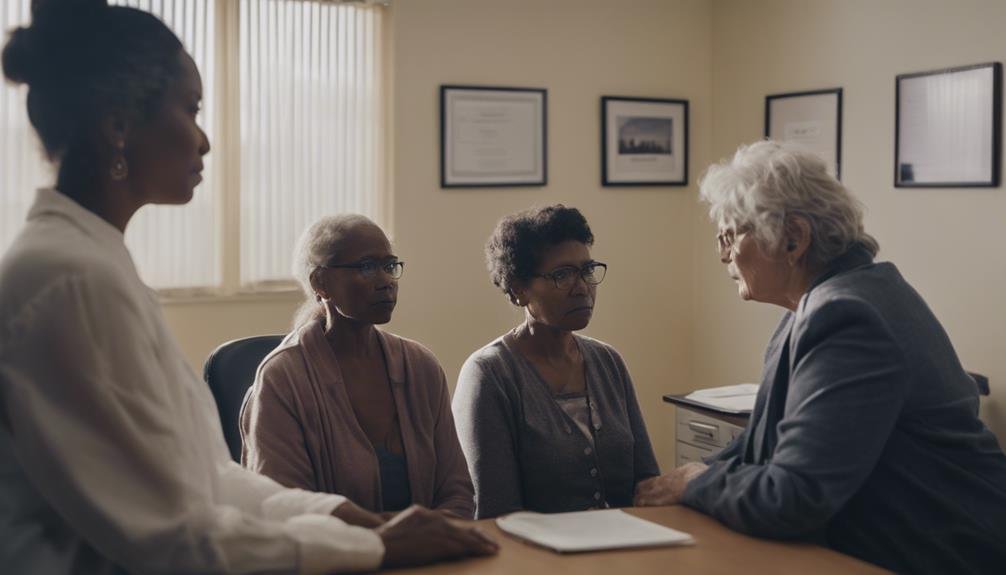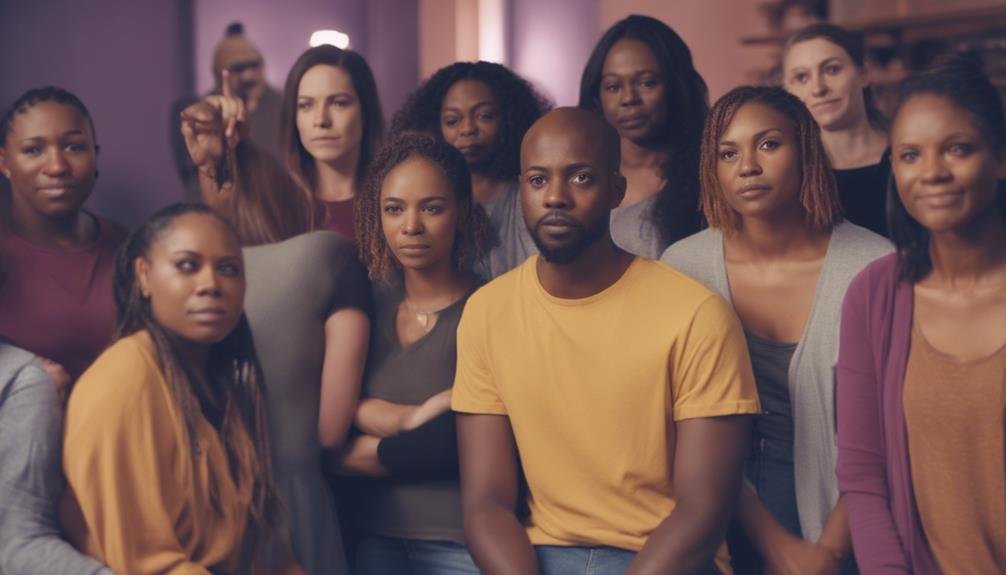If you’re facing domestic violence, make sure to know your rights for protection and justice. Seek help to understand legal definitions and the scope of abuse laws. Secure protection orders promptly to stop contact with the abuser. Legal actions include criminal charges and prosecution to hold offenders accountable. Numerous support services, like hotlines and community shelters, offer immediate aid. Financial and employment protections exist to assist survivors. Learn about custody rights to safeguard children and navigate the legal system. Immigrant victims have special considerations and protection under the law. Be certain you are aware of your legal options and take steps to protect yourself.
Key Takeaways
- Domestic violence laws define intentional harm against family members.
- Legal consequences range from restraining orders to potential jail time.
- Seek legal protections through reporting domestic violence.
- Protection orders prevent abusers from contacting victims.
- Survivors have the right to seek justice through criminal courts.
Legal Definitions and Scope
Understanding the legal definitions and scope of domestic violence is essential for recognizing and addressing abusive behaviors within relationships. Domestic violence laws specifically define abuse as the intentional harm or assault against family or household members.
It’s important to comprehend that the severity of the offense determines whether domestic abuse is classified as a misdemeanor or felony, leading to varying legal consequences. These consequences can include restraining orders, loss of rights, and potential jail time for the perpetrator.
Domestic abuse trials may take place in either criminal or civil courts, resulting in the arrest and prosecution of the individual responsible for the abuse. By reporting domestic violence, individuals can access legal protections, support services, and advocacy to aid survivors in understanding the legal system and seeking justice.
Understanding the legal definitions and scope of domestic violence empowers individuals to take action against abuse and protect their rights.
Protection Orders and Restraining Orders
To safeguard your safety and protection from an abuser, obtaining a protection order, also known as a restraining order, is vital. These court orders serve as an important legal mechanism to prevent abusers from contacting or approaching you, providing a shield against potential harm. By securing a restraining order, you can establish boundaries that help guarantee your physical and emotional well-being.
Victims seeking legal protection through restraining orders can find immediate relief from the threat posed by their abusers. By completing the necessary paperwork and articulating the reasons for seeking such measures, you can take proactive steps towards creating a safer environment for yourself and your loved ones.
Consulting experienced attorneys who specialize in domestic violence cases can offer valuable guidance and support throughout this process, helping you navigate the complexities of obtaining protection orders effectively. Remember, your safety is paramount, and taking action through legal avenues can provide you with the necessary protection and peace of mind.
Criminal Charges and Prosecution
If you or a loved one has experienced domestic violence, it’s important to understand that such actions can lead to criminal charges and prosecution in many states. Laws are in place to protect family or household members from intentional physical harm, with offenders facing potential arrest and legal consequences.
Domestic abuse is taken seriously, with the severity of the harm determining whether misdemeanor or felony charges are pursued. Perpetrators with a history of violence or causing significant injuries may be subject to felony charges for their actions.
In the justice system, survivors of domestic violence have the right to seek justice through criminal courts. It’s essential for individuals facing domestic abuse to be aware of their legal rights and the potential for criminal charges against their abuser.
Support Services and Resources
You deserve to have the support you need in times of crisis.
Helplines like the National Domestic Violence Hotline (1-800-799-7233) are available 24/7 to provide immediate assistance.
Seek safety and resources through community shelters that can offer you a secure space.
Helpline Availability for Support
Victims of domestic violence can access immediate support through the National Domestic Violence Hotline at 1-800-799-7233, providing an essential lifeline for those in need. This hotline operates 24/7, ensuring that help is just a phone call away.
In addition to the hotline, victims can reach out to the National Coalition Against Domestic Violence at 1-303-839-1852 for further resources and support. If you’re in Memphis, local assistance from the Memphis Police Department and Shelby County organizations is available to provide aid and guidance.
For legal assistance, consider seeking help from the District Attorney Generals Office, FBI, or ATF, who can offer valuable guidance on your rights and options. In the Western District of Tennessee, the Victim Witness Coordinator at (901) 544-4231 is there to support you and provide essential information.
Community Shelters for Safety
Community shelters play a crucial role in providing immediate safety and support for individuals fleeing domestic violence situations. These shelters offer confidential housing, counseling services, and resources to help survivors rebuild their lives.
Support services within shelters encompass legal advocacy, crisis intervention, and empowerment-based programs tailored to assist survivors in their journey towards healing and independence. In addition to these services, many community shelters operate 24/7 hotlines for individuals seeking assistance or information about domestic violence.
One significant aspect of community shelters is the provision of trauma-informed care by trained staff. This approach guarantees that survivors feel safe and supported during their stay, fostering an environment conducive to healing.
Financial and Employment Protections

You have the right to financial assistance options and job security rights if you’re a victim of domestic violence.
These protections include help with essential expenses and the ability to take leave under the Family and Medical Leave Act.
Legal support services can guide you through understanding and accessing these critical financial and employment protections.
Financial Assistance Options
If you’re experiencing domestic violence, know that there are financial assistance options available to help you navigate this challenging time, including employment protections and resources for basic needs.
As a survivor, you may be eligible for financial assistance through programs like the Violence Against Women Act (VAWA). VAWA not only provides funding for shelters and counseling but also offers legal aid to support individuals in abusive situations.
Under VAWA, employment protections exist to guarantee that victims can take time off work to address domestic violence concerns without the fear of losing their job. These financial assistance programs aim to help survivors maintain financial stability by offering resources for housing, utilities, and other essential needs.
Additionally, VAWA includes provisions to assist survivors in accessing economic resources and achieving financial independence after leaving an abusive environment.
Job Security Rights
During challenging times, victims of domestic violence are granted job security rights under the Family and Medical Leave Act (FMLA) in the U.S., providing essential protections for those facing abusive situations.
If you’re a victim of domestic violence, the FMLA offers important safeguards for maintaining your employment while dealing with the effects of abuse. You have the right to take up to 12 weeks of unpaid leave to address health concerns, safety issues, or legal matters related to domestic violence.
It’s vital to know that the FMLA covers eligible employees in companies with 50 or more employees, guaranteeing job security during difficult times. Your employer is obligated to maintain confidentiality regarding your situation and can’t discriminate against you based on your domestic violence status.
Legal Support Services
Legal support services play an essential role in assisting domestic violence survivors in managing financial challenges and safeguarding their employment rights. Survivors of domestic violence have legal protections under federal laws that guarantee their financial and economic stability. These services can help survivors navigate through obtaining financial compensation, accessing public benefits, securing stable housing, and seeking economic independence.
Legal aid organizations offer guidance on important matters such as filing for spousal or child support, protecting assets, and establishing financial security. Additionally, employment discrimination protections are available to safeguard survivors can maintain financial stability while seeking assistance.
Custody and Visitation Rights
Addressing the safety and well-being of children is paramount when handling custody and visitation rights in cases of domestic violence. Courts recognize the impact of domestic violence on custody arrangements and prioritize the safety of children in legal proceedings.
Legal protections are available to safeguard children in situations involving domestic violence. It’s essential for victims to understand their legal rights concerning custody and visitation.
Seeking guidance from a family law attorney can provide clarity and support in managing the complexities of custody cases linked to domestic violence. Family law attorneys can offer valuable advice on how to protect custody and visitation rights while prioritizing the safety of the children involved.
Immigration and Special Considerations

How can immigrant victims of domestic violence navigate legal protections and special considerations to safeguard their safety and well-being?
Immigrant victims facing domestic violence have legal options to protect themselves, such as the Violence Against Women Act (VAWA) and the U-Visa. VAWA enables abused spouses to seek legal status independently of their abusers, guaranteeing their safety and security.
However, cultural barriers and language differences can pose challenges for immigrant victims in accessing these crucial rights and support services. Additionally, the fear of deportation can prevent victims from seeking help, underscoring the critical need for legal protections.
Fortunately, Federal laws offer specific provisions to address the unique obstacles faced by immigrant victims of domestic violence. If you or someone you know is an immigrant victim of domestic violence, it’s essential to understand your rights and the resources available to support you through this difficult time.
Frequently Asked Questions
What Are the Laws Against Domestic Violence in the Us?
In the US, laws against domestic violence provide legal protections, support resources, a reporting process, restraining orders, criminal charges, civil lawsuits, and victim advocacy. You have rights and avenues to seek help and justice.
What Does the Constitution Say About Domestic Abuse?
The Constitution provides essential protections against domestic abuse, including due process and equal protection. Victim resources, support networks, and civil remedies are available. Reporting processes, protective orders, criminal charges, and the right to a fair trial are significant aspects.
Conclusion
Remember, when facing domestic violence, you have legal rights and resources to protect yourself. Stay strong and seek support from professionals who can help navigate the complexities of the legal system.
Don’t hesitate to reach out for assistance and know that you aren’t alone. Stay safe, stay informed, and stay empowered in your journey towards justice and healing.







